Supreme Court Declines Appeal Of Case Upholding Maryland Ban On Assault Weapons
The Supreme Court has declined to hear yet another Second Amendment case.
The Supreme Court has declined to accept yet another Second Amendment case for review, this time it’s a challenge to Maryland’s law banning so-called ‘assault weapons,” which was passed in the wake of the Sandy Hook shooting which occurred nearly five years ago:
The Supreme Court on Monday declined to review a Maryland law banning the sale of semiautomatic guns with certain military-style features.
The justices in the past have passed up the chance to hear challenges to similar laws in a handful of other states. But attorneys generals in 21 states had asked the court to step in.
Maryland’s ban on so-called assault weapons was passed after the 2012 mass shooting at a Newtown, Conn., elementary school.
A district judge had cast doubt on the constitutionality of the law. But the full U.S. Court of Appeals for the 4th Circuit in Richmond upheld the ban in a 10-4 vote
The ruling went further than other appellate courts that have reviewed similar laws in stating that “assault weapons and large-capacity magazines are not protected by the Second Amendment.”
The majority opinion, written by Judge Robert B. King, refers to the banned firearms as “weapons of war” that the court says are most useful in the military.
In a strongly worded dissent, Judge William B. Traxler Jr. said his colleagues have “gone to greater lengths than any other court to eviscerate the constitutionally guaranteed right to keep and bear arms.”
As usual, the Court did not explain why it declined to accept the case for review. The best we can say with any degree of certainty is that there were not four votes in favor of accepting the case, which is the minimum required for the Court to accept a case. Why this is the case is something that will remain a mystery unless and until one of the Justices retires and perhaps explains what might be going on behind the scenes when the Court is asked to review such cases. That doesn’t typically happen, though, so the best we’re left with is speculation and something that has become something of a pattern from the nation’s highest court since it handed down its last major Second Amendment case, McDonald v. Chicago, in which the Court struck down Chicago’s far-reaching ban on handgun ownership pursuant to its previ0us ruling in District of Columbia v. Heller and formally ruling that, like the majority of the rest of the Bill of Rights, the Second Amendment was applicable to the states via the doctrine of incorporation. The McDonald decision, of course, was handed down in 2010 and along with Heller, many Second Amendment advocates hoped that it would be the beginning of a series of cases in which the Court would strike down a number of gun control provisions across the nation, including both limitations on the concealed carry of weapons in public and outright bans on the ownership of certain types of weapons as the Maryland law does. Instead, what they’ve largely gotten is seven years of Federal Courts upholding challenges to such laws while the Supreme Court seems content to let those lower court orders stand.
This has included the Court’s 2013 decision to decline to hear the appeal of a case involving New York State’s laws regarding carrying guns in public , a decision in 2014 to hear a similarly restrictive New Jersey law regarding carrying concealed weapons, a 2015 case involving San Francisco’s law regulating handguns, and a 2016 decision regarding laws adopted by New York and Connecticut in the wake of the shooting at Sandy Hook Elementary School. As with this case, those last two cases also came with strongly worded dissents from Justices Thomas and Scalia arguing that the Court should have accepted the appeals. In fact, the only major case involving guns that the Court has accepted since its decision in McDonald involved one where a man was convicted for lying on his application for a background check when he purchased a gun that he quickly then resold to another party who would have been otherwise ineligible to buy a weapon. Most recently, the Court declined at the end of its last term to heard an appeal of the Ninth Circuit Court of Appeals ruling upholding California’s law regarding the concealed carry of weapons.
In the past, these decisions to decline to accept one of these Second Amendment cases was accompanied by a dissent from that decision signed by most of the members of the court’s conservative wing. When Justice Scalia was still alive, he was joined by Justices Alito and Thomas in such dissents that argued that the Court should have accepted that particular case, noting the number of other Second Amendment cases that the Court has let stand in the intervening years since McDonald, and arguing that the Court is incorrect in allowing the Circuit Courts of Appeal to have such a large say on the issue without establishing some national rule on the issue involved in the case. After Scalia died, Thomas and Alito took up the task of dissenting when the court declined review in case after case. This time there was no such dissent, suggesting that the Court’s conservative wing has, at least for now, given up its efforts to persuade the other Justices to accept these cases. The fact that these have been the only Justices to publicly dissent from a decision declining appeal also suggests that Chief Justice Roberts and Justice Kennedy have both been among the Justices voting to decline to accept review of these Second Amendment cases and that the addition of Justice Gorsuch to the Court has not significantly changed the Court’s apparent willingness to let the lower courts handle these issues.
At some point, one presumes that the Court might be inclined to accept one of these cases for review. The most likely situation where that might occur is if and when the Court is presented with a petition in a case that represents a Circuit split on the issue presented. So far, though, that has not happened and all of the cases that have come to the Court for review have involved cases where the court below upheld the state or local law being challenged. While there have been some cases where Courts have ruled against the laws, but none of those cases have made their way to the Supreme Court. In 2013 in the case Moore v. Madigan, for example, the Seventh Circuit Court of Appeals struck down an Illinois law that placed tight restrictions on the issuance of permits allowing citizens to carry a concealed weapon. Rather than appealing the decision, though, the Illinois legislature chose to change state law to bring it in line with the Court’s decision, thus making any such appeal moot. More recently, the District of Columbia declined to appeal a case in which the Court of Appeals for the District of Columbia struck down the city’s concealed-carry law. In discussing the reasons for this decision, District officials cited in part their concern that the Supreme Court would accept the case for review and uphold the lower court ruling, thus establishing a nationwide precedent that could be used to challenge state and local laws across the country.
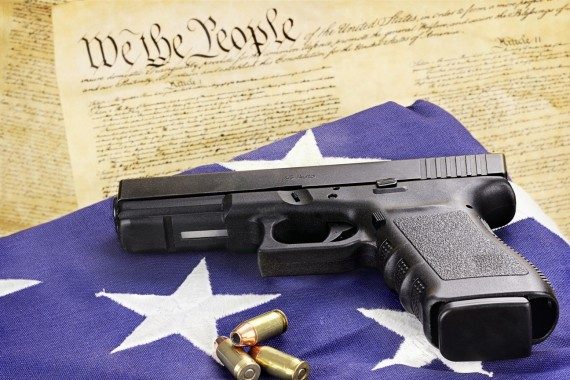


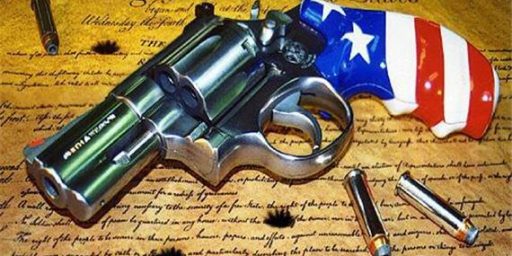
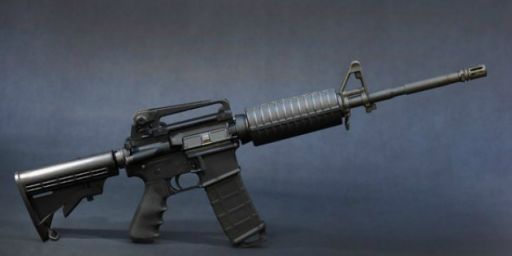
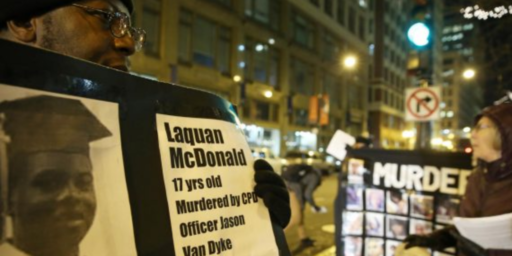
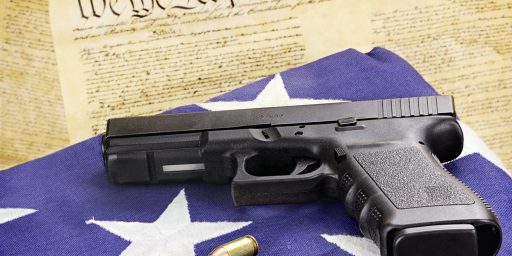
Is that photo appropriate to the Maryland ban? I’m not sure. Maybe one of the penile-prosthesis experts can tell us?
I’m mixed on this. If it’s the best we can do, to keep the populace safe, then I suppose it’s the best we can do.
I think there is a problem with limiting peoples access to high performance machinery of any type. If you start to apply the same logic to, say motor vehicles for instance, then it becomes problematic. I mean, who really needs a 300hp sport bike for the street? Do I really need my Ducati, which does 0-60 in 2.6 seconds? Who really needs a Bugatti Veyron? Or the new Tesla Model S? Do we really want to outlaw hi-performance? Do we really want to limit ourselves to mediocrity? Then where does that stop?
I’d rather we did more to severely limit the ability of fools and idiots and domestic abusers and other mental health cases to get guns…guns of any sort. We should also make extremely rigorous training and testing mandatory of all owners (my understanding of “well-regulated” in the 1st Amendment is that it meant well-trained and well-disciplined). Applying that to motor vehicles would also be acceptable, and so I think it is a fair approach. Such an approach would also be fully supported by the Heller decision.
But as long as the penile-prosthesis folks fight every reasonable approach to protecting the populace…then maybe unreasonable approaches like the Maryland ban are the best we can do.
Smells to me like Roberts and Gorsuch have fairly sensitive political antennae and no inclination to talk about guns after Las Vegas and Sutherland Springs.
There is an argument that definitions of “assault weapons” will be too vague and this law won’t prevent people getting them. These have some validity. But, as Reynolds used to argue, we really need to address the gun culture. Maryland has made a statement that “black guns” are not acceptable. Seems to me a step forward with little or no downside.
@gVOR08:
Dead on. Exactly what I thought.
@gVOR08:
Either that or they don’t think an assault weapons ban rises to the level of a full 2nd A challenge. The Heller decision did allow for regulation.
Appears to me that the 2nd Amendment is alive and well. The WHOLE 2nd Amendment, not just the parts the RWNJ like. You know, the “well regulated militia” parts too.
@gVOR08:
“Any automatic or semiautomatic firearm capable of holding more than 5 rounds of ammo.” There, I just defined them for you. Oh…. You mean define them in a way nobody will object to. You’re a dreamer.
Yet the average citizen out here does not live in a gated community with armed security or has their own private body guards whenever they go out somewhere. The average working people have to call 911 and wait an indeterminate time for the police to get there in case of a burglar or hold up. Many of the people out here do have guns for personal security, competition, or hunting and worry about any laws that would result in their guns being taken away. They follow the gun ownership laws to the letter and have generally supported sensible gun ownership law. Unfortunately gang members, violent criminals, kidnappers, serial killers, and terrorists do not pay one bit of attention to gun laws. These federal judges need to take all that into account with these decisions. The law abiding citizens have to live with and obey these justices’ decisions. The criminals pay them no attention.
Our community has very low crime incidents which are usually limited to minor things like bicycle thefts, unleashed dogs, parking violations, and illegal mufflers.